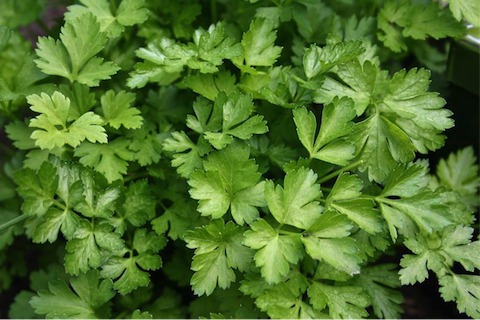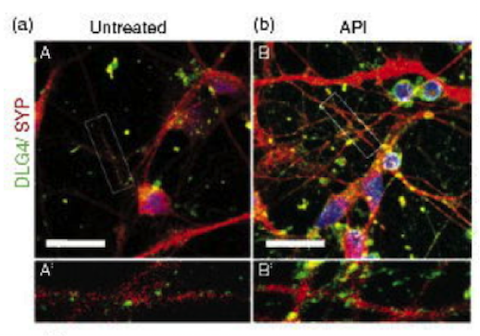
New research finds that a flavonoid called apigenin increases brain connections:
the flavonoid apigenin, a substance found in parsley, thyme, chamomile and red pepper, improves neuron formation and strengthens the connections between brain cells, new lab research demonstrates… and has potential to treat diseases like schizophrenia, depression, Alzheimer’s and Parkinson’s
Previous experiments with animals had already shown that substances from the same chemical group as the apigenin… positively affect memory and learning. Many studies highlight the potential of flavonoids to preserve and enhance brain function.
While the effectiveness of flavonoids for brain health is not an entirely new concept, this research is the first to show the positive effects of apigegin directly on human cells and the first to unraveling its mechanism.
The neurons that were treated with the apigenin flavonoid (API) show more formation of synapses (red) than the neurons that were not treated. You can see this in the image on the right.

The study concludes with this:
since flavonoids are present at high amounts in some foods, we can speculate that a diet rich in flavonoids may influence the formation of neurons and the way they communicate within the brain.
Yes! These are powerful foods and nutrients for brain health! And these flavonoids have been shown to specifically reduce anxiety too, as mentioned in this paper – Flavonoids and the central nervous system: from forgotten factors to potent anxiolytic compounds
A paper published in October 2015: Flavonoid nutraceuticals and ionotropic receptors for the inhibitory neurotransmitter GABA likens flavonoids to benzodiazapines:
A number of studies have likened flavonoids to the widely prescribed benzodiazepines as ‘a new family of benzodiazepine receptor ligands’.
It is time to consider flavonoids in their own right as important modulators of these vital [GABA] receptors in brain function.
So let’s eat parsley and get a decent serving size in a delicious salad. I’ve got the perfect recipe for you, created by Rebecca Katz, author of The Healthy Mind Cookbook. I interviewed her on the Anxiety Summit and this was our topic – Your Brain on Food: The Science and Alchemy of Yum for Alleviating Anxiety!
We talked about one of my favorite recipes from her book: a pomegranate olive mint salsa recipe
When I read the ingredients list I was surprised about the quantity of parley and mint but followed the directions anyway and the end result is incredibly yum! We LOVE this recipe – it has become a standard in our home. We have had it with both salmon and with lamb chops (it’s the best mint “sauce” for lamb).
Enjoy and let us know what you think! If you have a recipe that uses parsley feel free to share a link or the recipe in the comments.
You convinced me to go back to parsley. You mentioned you eat it with salmon, for neuronal genesis among other benefits. However, I do not believe there is any safe salmon. Even so-called “wild” salmon caught in the Pacific near Alaska and sold at Whole Foods is contaminated with mercury. I know for certain. I had myself tested and was found to be at the high end of so-called “normal” for mercury. I stopped eating it and substituted only white colored fish (such as sole) from Whole Foods and re-tested a few months later. My mercury count was three, almost four, times higher! That told me that most fish is contaminated with mercury now.
LOVE parsely, we have a large handful in our protein breakfast green smoothies…
Parsley pesto!
I realize fresh is the best. In the study did they experiment with dried or ground? Mom is sensitive to texture and taste. She grew up on the spice rather than fresh and can’t handle fresh spices.
Deb
Fresh is best but dried or ground has benefits too
Would essential oil of the herbs work?
Maite
I’m afraid I don’t know.
The essential oil does not contain apigenin, so you would not see the same effect.
I researched apigenin recently. What I found was that it is an acute NMDA receptor antagonist, it will bind to the NMDA receptor and block it so that glutamate cannot find a site to bind and cause an excitotoxic reaction. For me, blocking glutamatergic excitotocity is key in decreasing anxiety and panic disorder. I have had some success with parsley. I have also found apigenin in supplement form- there’s a company here in the US, Swanson Vitamins, that carries it in supplement form under their brand name- and am starting to experiment with it.